
The Peruvian Aprista Party is a Peruvian social-democratic political party and a member of the Socialist International. The party was founded as the American Popular Revolutionary Alliance by Víctor Raúl Haya de la Torre, who originally intended to create a network of anti-imperialist social and political movements in Latin America. Members are called "compañeros" (fellows), based on the fraternity espoused by Haya de la Torre. Originally a centre-left to left-wing party with democratic socialist and nationalist elements, the party moved closer to the political centre under the leadership of Alan García starting in the 1980s, embracing social democracy and later some Third Way policies. In 2006, the party adopted a new platform as García's second presidency implemented a series of policies labelled as centre-right, embracing free-market capitalism, dialogue with other right-wing parties and organizations in the country, and closer ties with the Catholic Church and Evangelical churches.

The People's Party is a conservative and Christian-democratic political party in Spain.
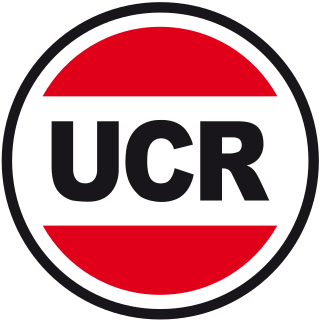
The Radical Civic Union is a centrist and liberal political party in Argentina. It has been ideologically heterogeneous, ranging from conservatism to social democracy, but since 1995 it has been a member of the Socialist International.

Miguel Ángel Blanco Garrido was a Spanish economist and municipal politician and a member of the People's Party, in Ermua, the Basque Country. He was kidnapped and murdered by the Basque separatist group ETA.

Carlos Arias Navarro, 1st Marquess of Arias Navarro was the Prime Minister of Spain during the final years of the Francoist dictatorship and the beginning of the Spanish transition to democracy.
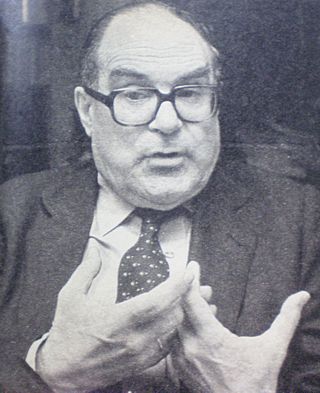
Julián Marías Aguilera was a Spanish philosopher associated with the Generation of '36 movement. He was a pupil of the Spanish philosopher José Ortega y Gasset and member of the Madrid School.

The New Alliance Party is a state-level political party in Mexico founded in 2005.

The People's Alliance was a post-Francoist electoral coalition, and later a conservative political party in Spain, founded in 1976 as a federation of political associations. Transformed into a party in 1977 and led by Manuel Fraga, it became the main conservative party in Spain. It was refounded as the People's Party in 1989.

Youth of the European People's Party (YEPP) is an umbrella organization of European political youth organisations and is the official youth wing of the European People's Party. YEPP brings together 64 centre-right youth political organisations from 40 countries all over Europe. Founded in 1997 by the 2006–2014 Prime Minister of Sweden Fredrik Reinfeldt, YEPP has developed into the largest political youth organisation in Europe.

New Force was the name of a far-right political party in Spain founded by Blas Piñar, director of the Institute of Hispanic Culture and longtime procurador in the Cortes Españolas during the Francoist period. Originally operating as a publishing house, FN sought to preserve Francoism in Spain during the transition to democracy. After its dissolution as a political party in 1982, it continued to operate as a publishing house under the same name, and its political activities and stylings were succeeded by the National Front party.

Ignacia de Loyola de Palacio y del Valle Lersundi was a Spanish politician. She was among the first women to rise to political prominence in Spain during the early years of reconstituted democracy. She was a minister in the Spanish government from 1996 to 1998, and a member of the European Commission from 1999 to 2004.
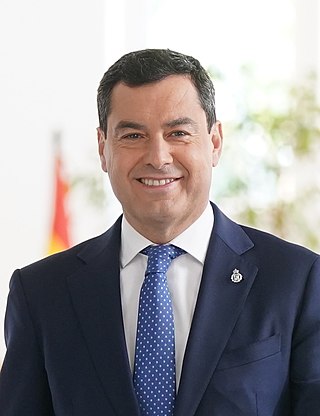
Juan Manuel "Juanma" Moreno Bonilla is a Spanish politician and president of the Andalusian branch of the People's Party. Since 18 January 2019, he has been the President of the Government of Andalusia. He represented the Cantabria constituency in the Spanish Congress of Deputies from 2000 to 2004 and the Málaga constituency from 2007 to 2011. He has also been a member of the Senate of Spain and Parliament of Andalusia.

Pablo Casado Blanco is a Spanish former politician. He was a member of the Congress of Deputies representing Madrid until 4 April 2022, having previously represented Ávila between 2011 and 2019. From 2015 to 2018, he also served as vice secretary general of communication of the People's Party (PP). From July 2018 until April 2022, he was the president of the PP.
The history of the far-right in Spain dates back to at least the 1800s and refers to any manifestation of far-right politics in Spain. Individuals and organizations associated with the far-right in Spain often employ reactionary traditionalism, religious fundamentalism, corporate Catholicism, and fascism in their ideological practice. In the case of Spain, according to historian Pedro Carlos González Cuevas, the predominance of Catholicism played an essential role in the suppression of external political innovations such as Social Darwinism, positivism, and vitalism in Spanish far-right politics.

Licinio de la Fuente y de la Fuente was a Spanish Francoist politician who served as Minister of Labour from 1969 to 1975. Promoter of the Democracia Social party during the Spanish Transition, he was one of the "Magnificent Seven", the seven political leaders who founded the federation of People's Alliance (AP) in 1976.
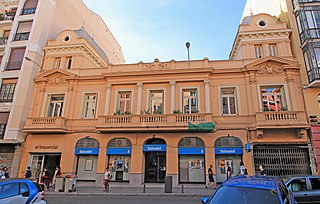
El Imparcial was a newspaper with a liberal ideology published in Madrid, Spain, between 1867 and 1933. Founded by Eduardo Gasset y Artime, it was one of the first newspapers in Spain published by a company as opposed to a political party.

Beatriz Isabel Álvarez Fanjul is a Spanish People's Party (PP) politician. She was elected to the Congress of Deputies to represent Biscay in November 2019, and was voted president of the New Generations of the People's Party (NNGG) in 2021.
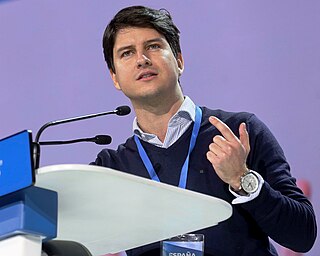
Diego José Gago Bugarín is a Spanish People's Party (PP) politician. He was a city councillor in Pontevedra in Galicia from 2015 to 2019, and was then elected to the Congress of Deputies. He was the president of the New Generations of the People's Party (NNGG) from 2017 to 2021.

María Beatriz Jurado Fernández de Córdoba is a Spanish People's Party (PP) politician. She was the president of the New Generations of the People's Party (NNGG) from 2011 to 2017 and a member of the Senate of Spain from 2011 to 2018, when she was elected to the Parliament of Andalusia.


















